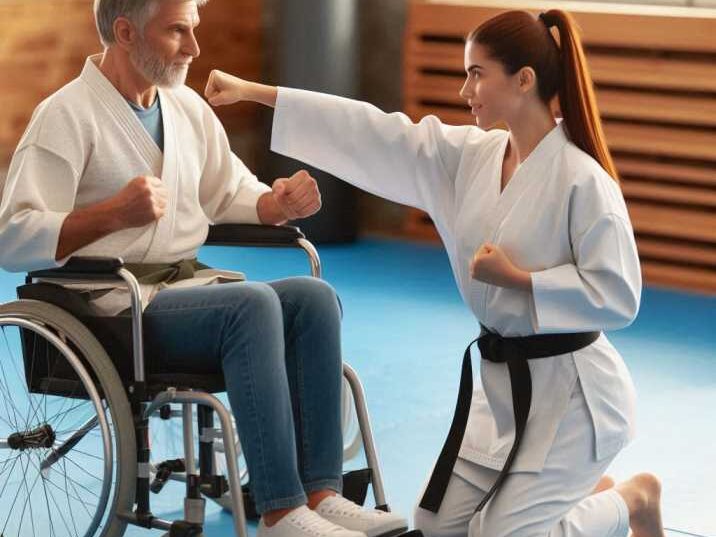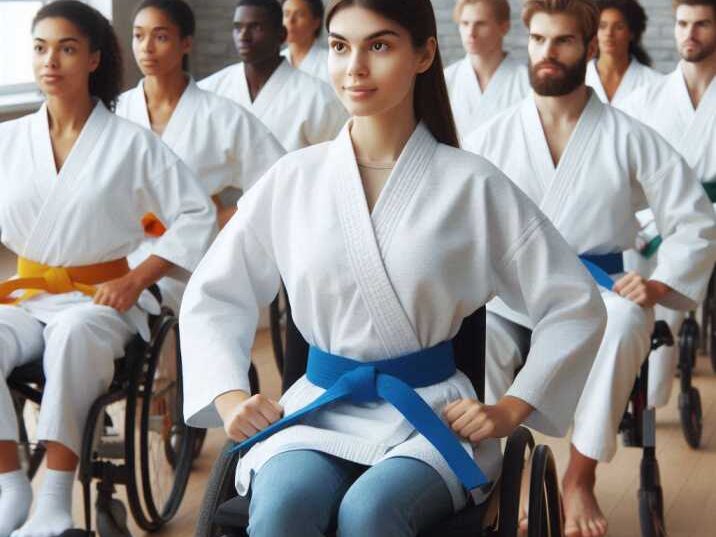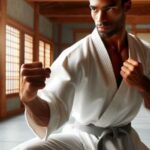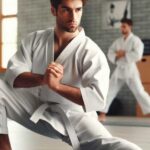Introduction
Table of Contents
Karate, a martial art known for its precision, discipline, and physical skill, is traditionally considered an activity requiring full physical ability. However, in today’s inclusive world, karate is opening its doors to people of all abilities, including those with disabilities. But can karate be practiced by people with disabilities? The answer is a resounding yes! This blog post will dive into how karate can be adapted, how people with various disabilities excel in martial arts, and the benefits they reap from practicing this powerful discipline. By the end of this post, you’ll clearly understand how can be an empowering, inclusive practice of karate for people with disabilities.

The Inclusivity of Martial Arts
Karate, and martial arts in general, have evolved to become more inclusive over the years. Many organizations and dojos around the world are working hard to make martial arts accessible to people of different abilities. This inclusivity movement goes beyond just allowing participation; it focuses on adapting techniques, modifying teaching methods, and creating supportive environments where everyone can thrive.
Karate’s Adaptability for Different Needs
One of the best things about karate is its flexibility in terms of practice. While it emphasizes movement, balance, and coordination, the techniques can be adjusted to accommodate varying levels of physical or cognitive ability. This adaptability is crucial for making karate accessible to people with disabilities.
For example, a person using a wheelchair may focus on upper-body strikes and blocks, while someone with limited vision can work on enhanced sensory awareness and close-contact fighting techniques. This shows that karate is not only about strength or agility but also about strategy, focus, and mental clarity—skills that anyone can develop regardless of physical limitations.
Types of Disabilities and How Karate Can Be Adapted
There are many different types of disabilities, each presenting its own unique challenges. Karate can be tailored to fit the needs of individuals with physical, cognitive, sensory, and even emotional disabilities. Let’s explore how this martial art can be adapted for people in various categories:
1. Physical Disabilities
People with physical disabilities such as limited mobility, amputations, or conditions like cerebral palsy can still practice karate through adapted techniques. A key modification for those with physical impairments is the emphasis on upper body movements, such as punches and blocks, over lower body techniques. Karate for wheelchair users may involve strikes that can be performed from a seated position, while stances may be modified to maintain balance for individuals with limited leg mobility.
Case Study: Adaptive Karate for Wheelchair Users
In adaptive karate, practitioners in wheelchairs focus on their core strength, hand techniques, and precision. They work on effective ways to defend themselves and build their upper body through strikes and blocks. Some competitions have separate categories for wheelchair users, recognizing the unique adaptations they make.
2. Cognitive Disabilities
For individuals with cognitive impairments, such as Down syndrome, autism, or developmental delays, karate can be an excellent way to improve focus, build self-confidence, and learn discipline. Martial arts like karate break tasks down into manageable steps, making it easier for people with cognitive disabilities to follow along.
Instructors can use visual aids, simplified language, and structured routines to help these students. Repetition is key in this context, as it reinforces learning and helps participants gain mastery over specific movements.
3. Sensory Disabilities
Individuals with sensory impairments, such as blindness or deafness, can also practice karate. For those with visual impairments, karate relies heavily on muscle memory and tactile feedback. Instructors may focus on helping blind students develop heightened spatial awareness and rely on touch to perfect their form.
For people with hearing impairments, communication in the dojo may be facilitated through visual signals, hand gestures, or sign language interpreters. Some karate schools even have instructors who are fluent in sign language to better support deaf students.
4. Emotional and Psychological Disabilities
Karate can be a therapeutic practice for individuals dealing with anxiety, PTSD, or depression. The discipline, focus, and physical activity involved in martial arts help to reduce stress, build self-esteem, and provide an outlet for emotional expression. Through consistent practice, people with emotional disabilities can find a sense of control and stability in their lives.
Benefits of Karate for People with Disabilities
Karate offers numerous benefits to people of all abilities. For individuals with disabilities, the physical, emotional, and social benefits can be life-changing. Here are some key advantages of practicing karate:
1. Improved Physical Health
Even with adaptive techniques, karate is a physically demanding sport. It helps improve strength, flexibility, and cardiovascular health. For people with disabilities, these physical benefits are especially important, as regular movement can help maintain mobility and prevent secondary complications.
2. Enhanced Mental Focus and Discipline
Karate requires focus, self-discipline, and patience, traits that are beneficial for everyone but particularly for individuals with cognitive or emotional challenges. Learning the precise movements and techniques requires attention to detail, and the repetition involved in karate training helps build concentration skills.
3. Boosted Self-Esteem
Mastering a new skill, especially in a physically demanding art like karate, can have a profound effect on one’s self-confidence. Many people with disabilities struggle with self-esteem, and the sense of accomplishment that comes from progressing through belt ranks or mastering a difficult technique can be incredibly empowering.
4. Social Inclusion
Karate fosters a sense of community and belonging. Dojos that practice inclusivity encourage social interaction, teamwork, and respect among all students, regardless of ability. This inclusivity helps break down barriers and promotes a sense of camaraderie.
5. Emotional Regulation
Martial arts are often used as a tool for emotional regulation. Karate teaches individuals how to channel their energy in a positive direction, which is particularly helpful for people with emotional or psychological disabilities. The structured environment, along with the focus on self-discipline, can help manage feelings of frustration or anger.
How Karate Schools Are Becoming More Inclusive
In recent years, many karate schools and organizations have taken steps to become more inclusive and accessible. Some dojos offer specialized classes or private lessons tailored to the needs of students with disabilities. Others focus on integrating students of all abilities into mainstream classes while providing additional support as needed.
1. Adaptive Karate Programs
Many adaptive karate programs have emerged that are specifically designed to teach people with disabilities. These programs often modify the curriculum and teaching methods to suit the physical or cognitive abilities of their students. For example, the Adaptive Martial Arts Association (AMAA) is a nonprofit that provides resources and support for individuals with disabilities who want to participate in martial arts.
2. Instructor Training
Inclusive karate schools often have instructors who are trained in adaptive teaching methods. This specialized training helps instructors understand the challenges that people with disabilities may face and how to adjust their teaching approach accordingly.
3. Supportive Dojo Environment
The dojo (training space) itself plays a key role in making karate accessible. Many inclusive dojos emphasize creating a welcoming and supportive environment where students of all abilities feel comfortable and encouraged to do their best. This atmosphere helps build trust between instructors and students and fosters mutual respect among peers.

The Role of Competitions in Inclusive Karate
Inclusive karate competitions are becoming more common, providing people with disabilities the chance to showcase their skills on a larger stage. Some tournaments feature separate divisions for individuals with disabilities, while others focus on integrating athletes of all abilities into the same competition.
These events offer a platform for adaptive athletes to demonstrate their proficiency in karate, inspiring others and promoting greater awareness about the inclusivity of martial arts.
Table of Information:
| Disability Type | Karate Adaptations | Benefits | Examples |
|---|---|---|---|
| Physical Disabilities | Focus on upper body techniques | Improved strength, mobility, coordination | Wheelchair karate, modified stances |
| Cognitive Disabilities | Simplified instructions, visual aids, repetition | Enhanced focus, cognitive processing | Step-by-step guidance, repetitive practice |
| Sensory Disabilities | Tactile feedback, visual signals | Improved spatial awareness, communication | Touch-based learning, visual cues |
| Emotional Disabilities | Stress management, emotional regulation | Emotional stability, stress relief | Breathing exercises, calming routines |
| Multiple Disabilities | Combined physical/cognitive adaptations | Holistic development, community building | Custom lessons tailored to individual needs |
Conclusion
So, can karate be practiced by people with disabilities? Absolutely! With the right adaptations, supportive instructors, and inclusive environments, karate can be an empowering and accessible practice for people of all abilities. Whether it’s improving physical health, boosting self-esteem, or providing emotional stability, karate offers numerous benefits for those with disabilities. By breaking down barriers and fostering inclusion, martial arts are proving that everyone, regardless of ability, can find strength, focus, and discipline through karate.
FAQs
1. Can someone in a wheelchair practice karate?
Yes, individuals in wheelchairs can practice adaptive karate, focusing on upper body techniques such as punches and blocks.
2. Are there karate competitions for people with disabilities?
Yes, many inclusive karate tournaments now feature divisions for athletes with disabilities, offering them a chance to compete on a larger stage.
3. Can karate help with emotional disabilities?
Yes, karate can help individuals with emotional disabilities by promoting focus, discipline, and stress relief through physical activity.
4. Do karate schools offer special classes for people with disabilities?
Many karate schools offer adaptive programs or one-on-one lessons for students with disabilities to ensure a personalized and supportive experience.
5. How does karate benefit individuals with cognitive disabilities?
Karate helps individuals with cognitive disabilities by improving focus, enhancing self-confidence, and offering a structured environment for learning and growth.


